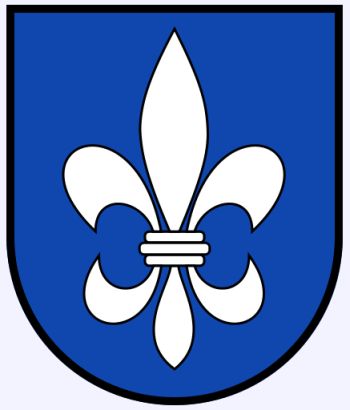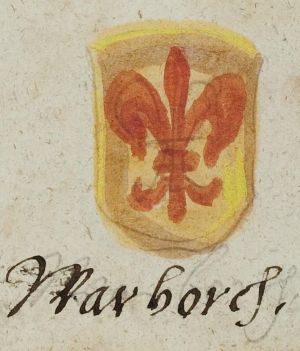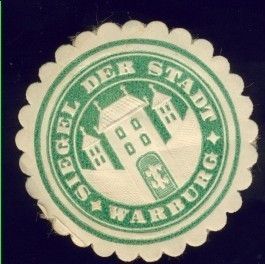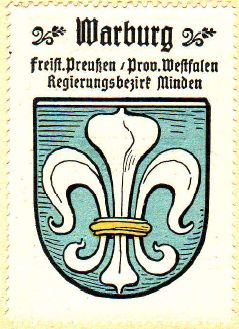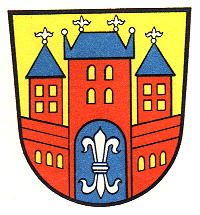Warburg: Difference between revisions
Knorrepoes (talk | contribs) m (Text replacement - "{{de}} '''" to "{{de}} '''") |
Knorrepoes (talk | contribs) m (Text replacement - "|center|Wappen von {{PAGENAME}}]] " to "|center|alt=Wappen von {{PAGENAME}} / Arms of {{PAGENAME}}]] ") |
||
| Line 7: | Line 7: | ||
Additions : 1975 [[Amt Warburg-Land]], Bonenburg, [[Calenberg]], Dalheim, Daseburg, Dössel, Germete, Herlinghausen, Hohenwepel, Menne, Nörde, Ossendorf, Rimbeck, Scherfede, Welda, Wormeln | Additions : 1975 [[Amt Warburg-Land]], Bonenburg, [[Calenberg]], Dalheim, Daseburg, Dössel, Germete, Herlinghausen, Hohenwepel, Menne, Nörde, Ossendorf, Rimbeck, Scherfede, Welda, Wormeln | ||
[[File:warburg2.jpg|center|Wappen von {{PAGENAME}}]] | [[File:warburg2.jpg|center|alt=Wappen von {{PAGENAME}} / Arms of {{PAGENAME}}]] | ||
{| class="wikitable" | {| class="wikitable" | ||
Revision as of 12:18, 16 August 2022
This page is part of the German heraldry portal Deutsche Wappensammlung |
Heraldry of the World |
|
German heraldry:
|
Selected collector's items from Germany:
|
WARBURG
State : Nordrhein-Westfalen
District (Kreis) : Höxter (until 1974 Warburg)
Additions : 1975 Amt Warburg-Land, Bonenburg, Calenberg, Dalheim, Daseburg, Dössel, Germete, Herlinghausen, Hohenwepel, Menne, Nörde, Ossendorf, Rimbeck, Scherfede, Welda, Wormeln
| German | |
| English | No blazon/translation known. Please click here to send your (heraldic !) blazon or translation |
Origin/meaning
The arms were granted on June 30, 1977.
Warburg was already a city in the early 13th century. In the 15th century the Alt- and Neustadt (old and new city) were finally combined into a single city. The oldest seals of the city date from 1254 and 1257 and show a gate in which was standing a bishop. The city belonged to the bishops of Paderborn, so it was likely that the figure was the bishop of Paderborn. In the meantime the fleur-de-lis appeared on the coins of Warburg since 1227. The fleur-de-lis also appeared on smaller seals of the city in the 14th century. The gate only appeared on the great-seals. The fleur-de-lis was also mentioned as the city arms in 1780.
In the early 20th century the arms still showed only the fleur-de-lis. Stadler, however, mentions in the 1960s arms based on the complete old seal. I don't know when the city adopted the larger composition as arms. In 1977 the city returned to the use of the fleur-de-lis.| The arms in a 16th century manuscript |
Seal from around 1900 |
| The arms by Hupp in the Kaffee Hag albums +/- 1925 |
The arms according to Stadler, 1960s |
Contact and Support
Partners:
Your logo here ?
Contact us
© since 1995, Heraldry of the World, Ralf Hartemink 
Index of the site
Literature : Stadler, 1964-1971, 8 volumes; Hupp, O: Kaffee Hag albums, 1920s


